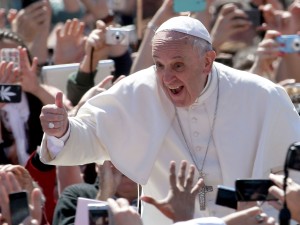You can’t govern without loving the people and without humility. ~Pope Francis
 This blog is a partial repost from my blog on Pope Francis’ one year anniversary. It seemed appropriate to repeat The Francis Effect on his first visit to the U.S.
This blog is a partial repost from my blog on Pope Francis’ one year anniversary. It seemed appropriate to repeat The Francis Effect on his first visit to the U.S.
Two years ago, I would dare say that the vast majority of the world would not have recognized the name Jorge Mario Bergoglio. Jorge, who we now know as Pope Francis, has nearly single-handedly started a revolution not only for the Catholic Church but for all of Christendom.
What fascinates me most is that his effect on us has not been because of his title, his title has merely introduced us to the man. It’s the man that has taken us by storm. Borrowing from Chris Lowney, author of Pope Francis: Why He Leads the Way He Leads, quoted in the Chicago Tribune, said, “In Bergogilo’s first days as pope, we were not watching someone trying to act like a pope. We were watching a person unafraid to be who he was.”
Lowney describes a Jesuits’ years long training, “much of which revolves around self-examination and working among the people they seek to lead. It’s ‘dirty-footed leadership’ with a focus on understanding other people and their circumstances and putting their needs ahead of one’s own.”
Tribune journalist, Rex Huppke, said, “The issue here is not one of religion or faith, but of encouraging people to look outside themselves. I would argue that’s the right thing to do on a moral basis, but in the workplace, it’s also the right thing to do pragmatically.”
Lowney boils down Pope Francis’ leadership to this: “Commit to yourself deeply, including your frailties, and come to some peaceful acceptance of yourself and your calling to lead. Then, commit to ‘get over yourself’ to serve a purpose greater than self.”
The Francis Effect: We can’t lead well without loving the people.